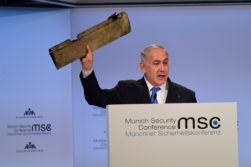
Prime Minister Benjamin Netanyahu holds up piece of Iranian UAV. Illustrative. Photo courtesy of Amos Ben Gershom GPO
The United States, France and the United Kingdom launched a joint strike on what the US defense establishment described as the “heart of the Syrian chemical weapons program” Saturday morning local time, and on Sunday Israeli leader Benjamin Netanyahu reiterated that his nation “fully supports” the decision to respond to chemical weapons use by the Syrian regime. Netanyahu, in comments released by his office, said he spoke with British Prime Minister Theresa May on Saturday night and “told her that the important international message of the attack is zero tolerance for the use of non-conventional weapons.”
As Syria’s neighboring country to the south, Israel has a significant stake in what happens in Syria. This is especially true given that the Assad regime and its allies Iran and Hezbollah are archenemies of Israel and the military threat was on full display when an Iranian drone invaded Israel with malicious intent in February. To that end, Netanyahu’s focus in discussing with the UK leader the response to Syrian chemical weapons attacks wasn’t limited just to the Syrian regime—or just to this one type of weapon of mass destruction.
“I added that this policy needs to also be expressed in preventing terrorist states and groups from having nuclear abilities,” said Netanyahu, recapping his talk with Prime Minister May. “I reiterated that the main element that is subverting the Middle East more than any other is Iran, and that [Syrian President Bashar al-Assad] must understand that when he allows Iran and its proxies to establish a military presence in Syria, he is endangering both Syria and the stability of the entire region.”
Israel has repeatedly spoken out against the threat of Iran’s military buildup in Syria, as well as the Iranian nuclear program. That Iranian threat was reemphasized on Friday when Israel’s investigation concluded that the Iranian unmanned aerial vehicle (UAV or drone) that invaded Israeli airspace in February was poised to attack Israel.
The IDF Spokesperson posted to Twitter on Friday that following an investigation into the drone’s flight path and other components of the attack, the IDF “concluded that the Iranian UAV was armed with explosives & was tasked to attack Israel.”
“By intercepting the Iranian UAV, IAF combat helicopters prevented the attack Iran had hoped to carry out in Israel. The UAV was identified & tracked by Israeli defense systems until its destruction, effectively eliminating any threat the Iranian UAV posed,” the IDF Spokesperson noted in a follow-up tweet.
Syrian Strike Successful
Within hours of the IDF announcing the review of the Iranian threat, the US lead a an attack employing more than 100 missiles from three nations against Syria in response to the latest chemical weapons attack by the Syrian regime on their own people. The US Department of Defense on Saturday told reporters the strike—jointly carried out with the French and British militaries—hit three sites in Syria’s chemical weapons program.
“The strikes went to the very heart of the enterprise, to the research, to development, to storage,” said Pentagon Chief Spokesperson Dana W. White in comments posted to the Pentagon website. “So we are very confident that we have significantly crippled Assad’s ability to produce these weapons.”
The Pentagon press briefing made it clear that the US has no interest in involvement in the Syrian civil war and that this strike was strictly to send a message regarding the use of chemical weapons. The US was not aware at the time of any civilian casualties or any hits to allied aircraft involved.
While the Syrian regime retains chemical weapons capability, Joint Staff Director Lt. Gen. Kenneth F. McKenzie Jr. highlighted the blow delivered in the strike by showing images of one of the targets, the Barzeh Research and Development Center.
“The Barzeh facility is a core site for them. And as you can see from the graphic it does not exist anymore,” said McKenzie in the briefing comments posted online.
“And we believe that’s going to—they’ve lost a lot of equipment. They’ve lost a lot of material. And it’s going to have a significant effect on them. So I think the words ‘cripple’ and ‘degrade’ are good, accurate words.”
(By Joshua Spurlock, www.themideastupdate.com, April 15, 2018)
